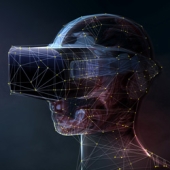It's a brave, new, immersive world with media and metaverse expert Luke Franks
IN BRIEF
- 4:54 - Kids massively value their digital identity there. $1 billion plus is spent per year on this for kids buying kind of fashion items and this sort of thing. Over half of all U.S. kids play Roblox every week.
- 15:24 - I think if you really want to get ahead, spending some time if you can to understand the technology and how it works at a basic level is really important.
- 20:47 - I do think the dawn of AI can't be overstated really. I think my big predictions is that it's not really going to fit into the models of society that we have now. It's probably going to reorganize it in ways that we can't fully imagine yet.
Luke Franks is an advisor, speaker and presenter who has fronted shows for ITV, BBC Radio 1 and Sky, as well as branded content for Netflix, Amazon and Spotify. He hosts the successful "Welcome to the Metaverse" podcast, where he interviews some the brightest metaverse minds each week. Recently named one of the top metaverse thought leaders and content creators worth following, Franks insight have been featured on VICE, the BBC, TalkRadio and in The Athletic. He joins Joe Kornik, Editor-in-Chief of VISION by Protiviti, on the VISION by Protiviti podcast to discuss the metaverse and its potential impact.
It's a brave, new, immersive world, with media and metaverse expert, Luke Franks – audio transcript
Joe Kornik: Welcome to the VISION by Protiviti podcast. I'm Joe Kornik, Editor-in-Chief of VISION by Protiviti, our global content resource looking to the future to examine big themes that will impact the C-suite and executive boardrooms worldwide. Today we're exploring the metaverse and its impact, and I'm excited to be joined by Luke Franks. Luke is an advisor, speaker and presenter who has fronted shows for ITV, BBC Radio One and Sky, as well as branded content for the likes of Netflix, Amazon and Spotify. He hosts the hugely successful and I might add outstanding “Welcome to the Metaverse” podcast where he interviews some of the brightest metaverse minds each week. Recently named one of the top metaverse thought leaders and content creators worth following, Luke's insights have been featured on Vice, the BBC, Talk Radio, and in The Athletic. I'm so happy to have him here with us today. Luke, thanks so much for joining the VISION by Protiviti podcast.
Luke Franks: Thank you, Joe. Thanks for having me. Good to be here.
Joe Kornik: Luke, I’m turning the tables a bit on you here as I know you're usually the one asking the questions. Let me just start by saying I absolutely love your podcasts and your takes on the future of internet culture, Web 3.0, and the metaverse. I've spent a lot of time listening over the last several months to your “Welcome to the Metaverse” podcasts. I've learned a ton by listening and you're obviously a big believer in the metaverse and its almost unlimited potential it seems. It’s impacting nearly everything we do so let me ask you why. Why do you believe in the metaverse? Why do you think it's sort of a can’t miss?
Luke Franks: Yeah. Thanks for the kind words. I appreciate it. Yeah, we’re at a really interesting time I think. What's really happening here is a combination of trends that are all colliding at the same time or about to and we're also at a point where I think there's enough evidence, enough kind of network effects to sort of confirm this fundamental shift, and that's happening in a couple of ways. I think the first is a move towards a more immersive experience of the internet. So from primarily kind of a 2D experience that we're all familiar with on websites and scrolling on our phone and that kind of thing to a more 3D experience in immersive worlds, probably as avatars as we go explore these new places and spend more time there and socialize there. We'll talk about more of that in a second. So there's the experience kind of shift that's happening, and then there's also this native kind of digital ownership layer, which is really crucial to what's happening as well, and that's kind of the Web 3, the blockchain, this sort of NFT component that's in its early days really as well.
So we’re certainly not there in that full vision yet, there’s plenty of work to do and there will be still and there has been obviously lots of failures along the way, plenty of volatility, skepticism. All very normal with kind of big technology technological shift like this. I see it really is as not dissimilar to the adoption of the internet the first time around. A new kind of fundamentally game-changing technology that went through these cycles, these human cycles of fear and greed, boom and bust, but ultimately sort of completely changed all of our lives in varying degrees. So I think that's where we are now. We can kind of dive into that a bit more detail as we go.
Joe Kornik: I'm curious though when it comes to its overall sort of global economic impact, the forecasts are sort of all over the map, right? They range from somewhere around $1 trillion US all the way up to like $15 trillion by the decade’s end. Where do you see the metaverse in terms of its global economic impact by let's say 2030?
Luke Franks: These huge numbers get thrown around obviously a lot. It's kind of hard to quantify, but it's to do really with the scale of what's happening here. So if we look at some evidence, what's happening in a new sort of parallel digital economy and what the next generation is growing up with as well, they're native to it. So Roblox is a good example. Roblox, for anyone who doesn't know but I'm sure plenty of people do, is a virtual world. You go in, you choose an avatar, and you go and explore various kind of mini worlds and mini games and kids are going there to kind of socialize and hang out, all the things that—when I grew up with the internet, I would wait on MSN over an evening waiting for my friends to come online and sort of chat to me. Now kids are avatars and hanging out and socializing and playing in these virtual worlds. If you're a parent, you'll probably know because your kids will be asking you to buy Roblox vouchers so that they can go and buy digital fashion items for their avatars in these worlds. Things that they care about. They care what they wear and look like there.
But yeah, if we look at some evidence, Roblox has about 50 million users a day which is pretty wild. That's a big number. The most visited experience has been played 30 billion times now just recently, which is very well when you think that the most watched YouTube video has been watched 11 billion times, so the next generation are already in this virtual world hanging out there and going back to play with their friends there. As I said, kids massively value their digital identity there. $1 billion plus is spent per year on this for kids buying kind of fashion items and this sort of thing. Over half of all US kids play Roblox every week. So that's what one example of what's happening. Fortnite is another kind of a blend of game play and social virtual worlds. A good example there when we’re thinking about like the scale of this digital economy, is virtual events that happen there. So there was a geek, a rapper called Travis Scott did a virtual show as an avatar there. Twelve million people attended because it was rolled out across the globe at various different times and he reportedly netted about $20 million from those performances, which was the equivalent of doing about 10 back-to-back physical arena shows for him as an artist, so you can begin to understand this kind of scale of digital assets and experiences around the world in these virtual worlds.
So next generation are growing up natively to all of that. They understand that straight away. If we're thinking about the sort of transition of these stages of the internet and where we're going, people talk about Web 1 as to sort of read-only layer of the internet, the kind of you'd hit a website and get back information. People talk about Web 2 as the sort of read-and-write layer where we were able to edit and send information and have things like social media and Wikipedia. This kind of group knowledge on the internet that we could edit. Now we're going towards what people are calling Web 3, this sort of ownership layer in these digital assets at scale. So yeah, that's the key thing, it’s the scale of where these valuations are coming from because it's a pretty big shift.
Joe Kornik: Right. You talked a lot about gaming there. Clearly I think gaming has been the big winner so far on the metaverse or the big entry point for most especially from a generational standpoint, right? The metaverse has really grown. Obviously with VISION by Protiviti we're focused on how business leaders and people much older than those people essentially playing games, or at least most of them, will be using the metaverse. So I'm just curious, are there business lessons to be learned from the success that gaming’s had in the metaverse? How do you sort of see that from a business leader’s perspective? What can they glean from the success of some of those companies you just mentioned?
Luke Franks: Yeah, 100%. I think a lot of this does come from gaming roots, right? Gaming is the biggest entertainment industry on the planet. Bigger than music and film put together. Interestingly as well, the average age of gamers is around 31, so there is this younger Gen Z generation growing up native to it, but there's also a slightly older generation who spend a lot of time playing games as well. When we look at the metaverse, now your brands can fit in there. I think there's also an interesting distinction between gaming and gamification as well, right? We can take some of the things that work in gaming and kind of bring them into this new more immersive world. I'll use Roblox again because there’s a lot of evidence there, but a company brand that has done really well—Nike has built Nike Land in Roblox and it's really interesting because you can go and experience a whole world. They've brought their brand in. It's kind of a sports-themed universe, sort of Nike Disneyland, if you like, where you can go and play, socialize, you can go and collect coins, and there's little gamification mechanics inside that world that keep people coming back, that's why the stats are so big in that world. People want to come back and they want to unlock these things and kind of level up and stuff like that.
So for a brand that’s looking to sell their product, whether it's natively digital or whether it's something that starts digital that they can then also link to a physical item as well or whether it's a marketing play or whatever it is, think about these gamification kind of loops and hooks, and customers spending more time in a brand world is a really attractive thing. It’s a way to kind of really engage people in a new way. There’s lots of kind of interesting examples there. H&M have done it well recently, allowing users to go and co-create with some of their items, digital fashion items in this world. Chipotle did kind of a maze in Roblox as well, so people had to kind of unlock things. Even kind of legacy artists as well, people like Elton John are beginning to reinvent themselves in this new explorable world for a new generation and a new audience. So yeah, it's a big opportunity thinking about it in that way.
Joe Kornik: Yeah. So interesting. I think one of the most exciting aspects of the metaverse is sort of the emerging technologies that enable it and all the new things happening. You mentioned some of them there. When you look at it, what are you most excited about?
Luke Franks: At the minute, a lot of the experiences are on devices that that we know, right? So on a desktop computer or on a mobile. That's where people are. Everybody obviously has a mobile in their pocket, so being able to kind of interact with these worlds in a familiar way is where we are now. We're seeing more consumer VR headsets begin to roll out. So Meta’s Quest 2 has been the one that's been there that’s sort of triumphed where it's been actually making its way into homes. It outsold Xbox in 2021 for the first time ever, so we're beginning to see that finally VR sort of have a piece of the pie in a consumer way.
There's rumors around Apple releasing their mixed reality headset, so the kind of augmented reality layer of stuff I think will get really interesting next year where it’ll be a headset, but you'll be able to see the physical world as normal. It kind of adds layers of reality on top of that, which I think is interesting, so they're kind of happening slowly and that's growing as well. AI has really come into the public consciousness recently with things like ChatGPT because it's so tangible. You can go and use it and that’s a whole separate conversation on its own, but yeah, we're at sort of 0.001% of what AI can do and how it's revolutionizing sort of workflows. If you've not played with ChatGPT, just Google it and go on it and you can ask it anything. It's like having an assistant that has a hive mind of all the knowledge in the world and you can begin to get it to think about SEO for you or come up with a business plan and then you have the art tools where you can create these incredible art pieces and things like that.
I think that all plays into this bigger trend of more immersive worlds that we're shifting to. If we think about going into these worlds, we're going to need the content there and users will build some of that and AI tools will help build that. We're going to need a lot of content. It’s going to need to be immersive and fun and constantly kind of updated and AI has a role to play there as well. So that's all happening. I think it'll be interesting if Apple do drop their headset soon. That may be the next inflection point. If Facebook changing their name to Meta was the first one, perhaps the Apple headset is the next one.
Joe Kornik: Well Luke, you certainly spend more time in the metaverse and these virtual spaces than I do and probably more than most people I know. I know you own digital real estate and NFT horse racing stable and lots of sort of rare digital sneakers so I'm fascinated by this. So for the skeptics among us, including I think plenty of business leaders, and there's a lot of skepticism out there in the business community, help us make sense of that. Are those just sort of cool things to own? Are they investments? Are they just for show? Should businesses be buying digital assets? Should I be buying digital assets?
Luke Franks: Yeah, understandably a lot of skepticism and for good reason as well. Even when there was a big technological shift as I say, greed comes in as it always does for these kind of cycles and we get way ahead of ourselves and things need to correct and go back to a phase of building actually good things with good utility that people want to use, and that's kind of the phase we're in now after kind of the massive hype. In terms of the investment and the NFT side of stuff, where there’s understandably a lot of skepticism, I think it's like any investment really. You have to spend a lot of time doing deep research sorting out the wheat from the chaff of which there is a lot of but understandably and totally agreeable, 95% of it is probably nonsense at this point, but understanding what assets have significance and potential value, why the creator or company’s story is important and relevant and might have an asymmetric return in a digital-first economy if that's the way that we are seeing this trend go. So some of my bets. Yes. Some are for fun, like the horse racing stable thing is, I think it was run where you can own and breed your horse and go race it online. It's kind of ridiculous but kind of interesting and the DNA of each of the horses gets passed down to the child one. It’s mad, but it's fun and interesting and cool. There’s a whole art scene as well, so I have something called a Chromie Squiggle, which if you Google and you look at you'll think, “What is that?” but has a place in the history of generative art on the blockchain proving the uniqueness and using a certain technique. It was one of the earliest ones. So like lots of art, it’s disruptive and weird and people criticize it at the beginning, especially in a big art move, but if it has relevance and historical significance, well maybe that's a bet. Then we talked about the sneakers and stuff like that and that’s kind of a bet on the culture.
There’s a company called RTFKT as it’s stylized, which got acquired by Nike at the end of 2021. They are really pushing the forefront of all these trends that we talked about, this kind of gaming culture, people valuing digital assets, and sneaker culture in this kind of new breed of internet culture there, so there’s some historical releases there. Nike, we're going to move in this space. They had a plan to release something called crypto kicks sneaker. This was all part of what they wanted to do, but kind of RTFKT, this company came along, did it first, and so Nike acquired them in the end. We’re starting to see kind of digital sneakers linked to physical ones as well, so you can kind of connect them and see your physical sneakers story through the digital side of stuff as well. So it's these two things coming together, so that's kind of why where my bets are. They’re few and they're concentrated.
Yeah, that’s my view, is that there's some asymmetric returns here but as always, all the standards are things apply of not financial advice and all the rest of it, but that's kind of my approach from that.
Joe Kornik: it's so interesting. So shifting back to business leaders because I really think they are confused about where they sort of are in this point in time. They're being asked about the metaverse, they're probably making decisions about investments in the metaverse, both capital and resources, time, infrastructure. Clearly the metaverse was hot, then it was not. There were some layoffs. There's been some investment, probably not a ton of return so far. So what advice would you give an executive trying to figure this all out?
Luke Franks: I think if you really want to get ahead, spending some time if you can to understand the technology and how it works at a basic level is really important because once you understand what's happening here and—I can give the very quick example of how I explain NFTs to people—is generally, if you think about a physical item that we all agree is valuable. So if you take the Mona Lisa for example as an art piece and you ask why that is, “Why is that valuable?” It’s kind of valuable for three reasons. The first is that we know who the creator was. Leonardo da Vinci, one of the most famous creators or artists of all time. That story is important there. We also know that that piece is scarce, right? There's only one Mona Lisa that was ever created in the world. We also know who owns that now—the Louvre in Paris, right? We have kind of three criteria therefore what we agree on has physical value. Blockchain, on a technological level, is for the first time ever enabled that same criteria in the digital world so we can now prove who created something, the fact that it's unique and scarce, and track the ownership now, so that's kind of the revolution.
The reason why people got so excited about this was like, “Okay. We can prove value in the digital world.” That doesn't mean everything is going to have value because if your story is not important, then so what? But understanding a technical level is helpful I think because it kind of clicks the pieces together.
I think then go and experience the culture with an open mind if you can. Talk to your kids or young relatives about what they value and why. Why do they want Roblox vouchers for their avatar, and through different generations it might be hard to understand. It’s hard with music moving maybe from physical CDs or cassettes into digital music. Feels like you're not holding anything tangible but those shifts happened, right? It's happening again here as well. So spending a bit of time in the culture and understanding what people value in the space with an open mind I think is important.
hen think about what your product or your service might look like in a more digital and immersive setting. How can you offer that in a way that doesn't alienate your current customers but might be exciting and new and open new avenues in the digital world? Once you've done all of that, then I think you're kind of positioned to make a smart decision about where you fit. I'd say move quickly but thoughtfully and get educated first I think it is the way, especially in this phase now. The hype is kind of moved on a little bit, so it’s a good time to just get educated now and begin to research and plan.
Joe Kornik: Yeah. I think that the danger is thinking, perhaps on some level, too far ahead, right? There are things that could be happening in the short term. Are there short-term business/short-term gains that could be had in the next 18 months or so rather than thinking about the metaverse is something that's a decade or a decade before we see the full impact of 3D and all this sort of various things that come along with that?
Luke Franks: Yeah. I think we've been through some of the evidence that's there. If your product or service fits in that and you maybe don't want to go fully deep into the whole blockchain space of releasing your own NFTs and you need to understand why you would do that, you need to understand that you'd be building a community around this stuff that's tradable. If you're not ready to kind of go there, maybe you dip a toe in the centralized options that are there. These virtual worlds, maybe do an activation and experiment with it for a few weeks and see, “Do I get that engagement back? Has it been helpful? Has it sold products?”—whatever it is, and maybe try it there temporarily without going to spend millions by buying land in one of these worlds that's in a very early phase. So I think going to the place where the evidence is to experiment is probably a good thing. If it was me and I'd be hiring somebody into, or getting somebody in to go through this, and through the education, and through what's happening, and through the culture of the space just to make sure it's not running away from you, but you don't have to put all your eggs in your basket and make some outsized bet if you don't fully understand why I think is the key thing here.
Joe Kornik: Last one for me. Now I am going to ask you to sort of think a little further out if you could. Give me your vision of this space whether we call it Web 4 or Web 5, I don't know what's going to be called a decade or more from now. Let's go out 10 years. What do you see in this space or in the metaverse in 2033?
Luke Franks: Yeah. Huge question. I think anyone who says they know is lying because nobody for sure does know. I think we'll probably see the metaverse adopt, in a similar way to how we saw the internet adopt the kind of first time rounds, except much faster because when the internet was adopting, we didn't have the information rails of the internet, right? So we're moving faster and all the technological shifts are happening in a short amount of time and AI is going to supersize all of that and make everything faster than before. It doesn’t mean there won’t be volatility and we won’t get things wrong along the way, but I think it adopts this experience of a more immersive internet and digital assets and people caring about adapts more is going to adopt, first with the younger generation and the early adopters who are already here and that's already happening, and then gradually through the older generations to a lesser extent exactly like the internet did.
But I do think the dawn of AI can't be overstated really. I think my big predictions is that it's not really going to fit into the models of society that we have now. It's probably going to reorganize it in ways that we can't fully imagine yet. I think it'll be a lot of controversy, a lot of misinformation, a lot of volatility, but also loads of positive outcomes that humans are bad at predicting as well. We always jump to the kind of the fear and crave safety with any shift as well, but I think there is lot of good will come from all of this. That is happening now as well.
Those that learn about it and—adapt now have the most upside potential for sure—but in time I think the digital economy will become more valuable than the physical economy because of that scale that we talked about at the beginning. It’s just unrivalled, right? You can't possibly recreate that in a physical way, so the scale of digital assets being sent around the world with no physical product that's needed to ship them and it's tradable on an open marketplace all the time, I think that will happen in time. But ultimately yeah, I hope that our digital lives will be will be richer, more social, and immersive. There'll be better experiences. It's not about replacing physical reality, it's about replacing the hours on end of scrolling on the screen on Facebook or Instagram or LinkedIn or whatever you do, replacing that with a with a richer, more social experience, right? We’ve seen the trend towards less unnecessary work travel and less physical goods. That can be a good thing. Hopefully we’ll have richer digital lives and hopefully richer physical lives in a more sort of sustainable way as well. Or I think AI will destroy us all, so time will tell. We’ll see. [Laughter]
Joe Kornik: Well on that note, Luke, yeah, I think we'll wrap it up there. Thank you so much. This was fun. So enlightening. Thank you so much for the conversation.
Luke Franks: Thank you very much for having me. Appreciate it for having me on and it's been really fun.
Joe Kornik: Thank you for listening to the VISION by Protiviti podcast. Please rate and subscribe wherever you listen to podcasts and be sure to check out all the metaverse content we have at vision.protiviti.com. Also you should certainly look in on Luke's podcast, Welcome to the Metaverse. We have a link to it in his intro and bio and in the show notes as well. Thanks for listening. We'll see you next time.
Luke Franks is an advisor, speaker and presenter who has fronted shows for ITV, BBC Radio 1 & Sky, as well as branded content for the likes of Netflix, Amazon and Spotify. He hosts the hugely successful "Welcome to the Metaverse" podcast, where he interviews some the brightest metaverse minds each week. Recently named one of the top metaverse thought leaders and content creators worth following, his insight have been featured on VICE, the BBC, TalkRadio and in The Athletic.



































